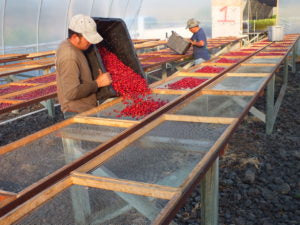A dark joke in Kona for years has been that Kona grows 3 million pounds of coffee each year while 5 million pounds of Kona Coffee is sold. Now a new class action lawsuit claims it isn’t 5 million, it is 20 million pounds of coffee labeled “Kona” that is being fraudulently sold on the world market.
The class action lawsuit by three Kona coffee farmers claims that larger retailers including Amazon, Costco, Safeway, and Kroger have been selling 19 different brands of coffee that have been mislabeled as Kona. The Plaintiffs claim that they can prove through scientific tests that the coffees being sold did not originate in Kona. They say that you can detect the origin of even roasted coffee beans by the amount of certain chemical elements in the beans. One of the Defendants attempted to have the case dismissed but the judge refused.
How to make sure you are buying real Kona coffee:
Buy Farm Direct
Most coffee is sold from the farm, to a mill, to a several different distributors, to a roaster and finally to a retailer. Every time coffee changes hands there is the possibility it will be adulterated or mislabeled. Roasted coffee is one of the most adulterated foods in the world. If you buy direct from the farm you only have one chance for mislabeling.
Talk to the Farmer
Quality coffee farmers are proud of their farms and their coffee. They want to talk to you (sometimes they won’t shut up!). If the farmer won’t talk to you maybe they are ashamed of their coffee.
Know the Grower
Ask where beans came from. The large distributors buy hundred of pounds of coffee fruit at roadside stands. They don’t know anything about the beans. They don’t know what chemicals were used to grow the beans, how they were stored or when they were picked. If you visit some of the large distributors you can smell the rotting beans being pulped and processed.
It is common for farmers in other Hawaiian regions to bring their coffee fruit to big distributors’ roadside stands in Kona to get a higher price. Some large distributors mix the beans from hundreds of different farms. If the seller can’t tell you which farm grew his Kona coffee then he doesn’t know if the beans are really Kona.
One way that farmers dump off their inferior coffee is to sell it to the large distributors. The distributors mix it with all of their other coffee beans to mask the bad flavors.
Avoid Kona Blends
Taking two or more good coffees and creating a great coffee is a noble enterprise. Taking bad Kona coffee, smothering it with coffee from another country and labeling it “Kona Blend” is a fraud. Most “Kona Blends” are 10% Kona and 90% Central American coffee. Even if the Kona was good quality, you couldn’t taste it. It is almost impossible to taste 10% Kona in any blend. Kona blends prey on unsuspecting buyers who want Kona coffee at the lowest price.
Check the Price
A major indicator of mislabeled Kona beans is price. A farmer in Central America pays his laborers $4 to $6 a day to pick and process coffee beans. A Kona farmer pays $120 to $250 a day to process Kona beans. Land in Central America is a faction of the cost of Kona agricultural property. Real Kona coffee is expensive because the cost of production in Kona is so expensive. If the price is low then the coffee is probably fake.
Hula Daddy Kona Coffee LLC is a boutique farm in Kona, Hawaii that grows, processes and roasts its own current crop coffee beans. We grow 7 different varieties of coffee and process them using 4 different methods. We roast date every bag of our coffee.
In 2019, Hula Daddy won First, Fourth and Fifth place in the Kona Coffee Competition. In 2018, Forbes Magazine picked Hula Daddy as one of the Top 12 Coffee Roasters in the United States and the only one that grows its own coffee. Also in 2018, Coffee Review selected Hula Daddy out of the thousands of coffees it tastes every year as the Number 1 Coffee of 2018. In 2017, we came in Second in the Hawaii Cupping Competition and in the Kona Coffee Cupping Competition. In 2017, Laura’s Reserve SL-28 received 97 points from Coffee Review and was Number 2 in the Top Coffees of 2017. In December 2016, Coffee Review rated our Laura’s Reserve SL-28 as Number 3 in the Top Coffees of 2016.

